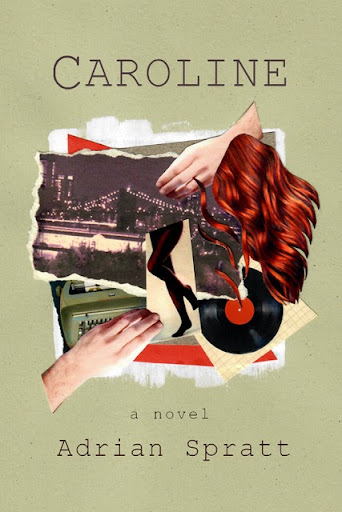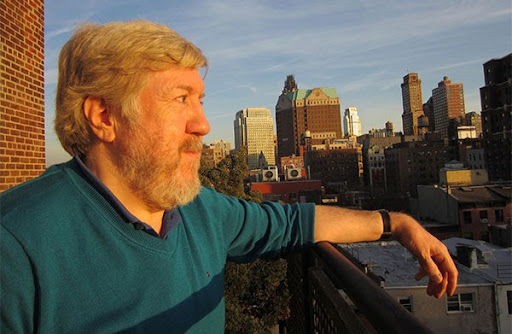 Author pulls from experience with law, blindness in propulsive new literary thriller
Author pulls from experience with law, blindness in propulsive new literary thriller
NEW YORK – Passion meets perplexity in the gripping new novel, “Caroline” (Feb. 15, 2022, Books Fluent), Adrian Spratt explores the past with a deft hand in his new book, pulling from the best of literary and historical fiction, with a touch of mystery.
In 1980s New York City, young lawyer Nick Coleman meets free spirit Caroline Sedlak in an evening fiction writing course. A vivacious fixture at a Greenwich Village bar, she remains mysterious about her life until their teacher reads her story submission to the class, and Nick realizes that a darker past lurks beneath her happy-go-lucky exterior. This doesn’t trouble Nick, who struggles with demons of his own: as a blind lawyer launching his career prior to the Americans with Disabilities Act, he struggles to prove himself at a law office that handles appeals for indigent convicted felons.
Nick’s practical, goal-driven approach to life balances Caroline’s quixotic nature, and their friendship soon deepens into something more. For some time, they’re happy together. But as the two become closer, Nick’s reluctance to commit collides head-on with Caroline’s need to be loved and belong. Soon, they realize that Caroline hasn’t left her past far behind after all … and the behavior that Nick once found charming first frustrates, then terrifies him. As the two spiral toward an inevitable clash, Nick must choose between the life he thought he wanted, and the woman he can’t bring himself to admit he loves.
“Caroline”
Adrian Spratt | Feb. 15, 2022 | Books Fluent
paperback | 978-1-953865-45-8 | $15.99
ebook | 978-1-953865-46-5 | $7.99
Audiobook | 978-1-953865-48-9 | $11.99
Literary fiction
 More about ADRIAN SPRATT
More about ADRIAN SPRATT
Adrian Spratt practiced law for twenty years, mainly in consumer protection, before returning to his first love, fiction writing. He graduated from Amherst College and earned his law degree from Harvard. Retinal detachment led to his loss of vision when he was thirteen. Today, he lives in Brooklyn with his wife, the artist and photographer Laura Rosen. His website, where he maintains a blog and showcases selected stories, essays and memoir excerpts, is www.adrianspratt.com.
In an interview, Adrian can discuss:
- How his experience as a lawyer affected his writing
- How his main character, Nick, is and isn’t like him
- The genres he pulled from to make a unique book
- His writing process from childhood to present-day
- His ‘novel within a novel’
- The book’s extended flashback to the 80s
An Interview with Adrian Spratt
Was writing always on the table for you? Did law school push you toward or away from this goal?
When I was nine, I wrote a poem that the school’s principal published in a newsletter to parents. It told me I might actually have a talent, and one way or the other I kept working at it. Even law school couldn’t beat the creative writer out of me. I kept writing poems and wrote the first draft of a memoir. Two years into my first full-time law job, like Nick, I took a writing course, only it was in poetry at the apartment of a husband-and-wife poetry team. I later abandoned poetry for fiction.
How did your experience as a lawyer come into play in the book?
Like Nick, I worked for a public defender’s office my first two years out of law school, and also like him, I learned that victory is a rarity — that most often the objective is to seek fairness even if it doesn’t change the result.
I also encountered the kinds of frustrations Nick does with superiors who made assumptions about disability, and like him, I couldn’t figure out how to ease the tension. It was different with my colleagues there, more like Nick’s honesty with his friend Jack and Jack’s common-sense reactions. When Nick moves to the EPA, he encounters the level of sensitivity I did at other offices, although there was always one battle or another to fight.
What parts of Nick are based in real-life?
I hope the whole of Nick reflects real life. Now, is that my life? Bits and pieces of Nick are me, but he’s also bits and pieces of other people I’ve encountered along the way. The story dictated who Nick starts out as and who he becomes.
How did reading and writing help you through tough times as a child?
In another parallel with Nick, I lost my vision when I was a teenager. Once I learned braille and how to type, I cranked out poem after poem. Writing became an outlet, even though the poems were rarely explicit about feelings. It was my version of acting out. Expression is sufficient for a teenager even if the form it takes bears little resemblance to what’s going on inside. It’s a byproduct, a symptom, a release.
During that time, reading was an escape into lives other than my own. I’ve come around to believing that denial is a critical stage in the response to trauma, and reading gave me that time.
Why did you decide to pull from different genres to make ‘Caroline’?
There has been no satisfactory fiction with leading blind characters written by blind authors. If any fiction has influenced me, it’s by opposition. Take Anthony Doerr’s justly admired 2014 novel All the Light We Cannot See, where the blind woman character is so idealistically portrayed that, for me and other disabled readers, it detracts from an otherwise beautiful novel. I read mysteries, comedies, literary fiction, legal thrillers, psychological drama, suspense, memoirs, social satire. They all came together for me as the novel evolved. Even fantasy, a genre I usually avoid, contributed a kind of mystical atmosphere I find in fiction by Jon Fowles, Michael Chabin and, yes, Anthony Doerr.
Did you have to do any extra research for the part of the book set in the 80s?
This novel required little new research. I drew on my knowledge of New York criminal law for Nick’s cases. Also, I traveled quite a bit in those years; hence the details of Brooklyn Heights, Manhattan, Connecticut, Paris and Provence. Politics doesn’t play a role in this novel other than a metaphorical allusion to Ronald Reagan’s avowed optimism, ironic in light of my later consumer protection work where much of our energy was directed at making up for his administration’s lax enforcement of food labeling, car safety and other standards. I did need to research environmental law, which I’ve never practiced. I also needed to do a little research into Catholic, Protestant and Jewish theology, as well as some psychology. None of that was specific to the 80s, but it did help ground the novel and its characters.
Is Caroline, the character, based on real life?
I drew on a host of experiences, my own and those of friends, in creating the character, Caroline. But no, this isn’t biography. Biography is about a single life, our curiosity about that life and perhaps the inspiration or lessons we can take away from it. Even if a woman existed whose life was faithfully recounted in this novel, Caroline the character would still be a product of the imagination. Fiction goes beyond fact. The shroud of mystery around Caroline is akin to the mystery that’s in each of us.

A former award-winning journalist with national exposure, Marissa now oversees the day-to-day operation of the Books Forward author branding and book marketing firm, along with our indie publishing support sister company Books Fluent.
Born and bred in Louisiana, currently living in New Orleans, she has lived and developed a strong base for our company and authors in Chicago and Nashville. Her journalism work has appeared in USA Today, National Geographic and other major publications. She is now interviewed by media on best practices for book marketing.

